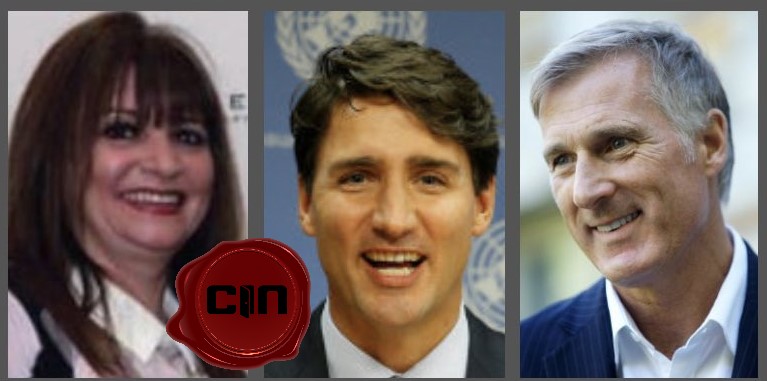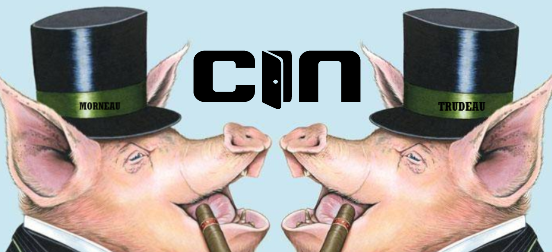One thing George Soros, Justin Trudeau, SNC-Lavalin, and the People’s Party of Canada (PPC) have in common is the Canada Investment Bank (1). Since the Civilian Intelligence Network began covering Johanne Mennie and her involvement with the social economy and global communism (2), many naysayers have commented that Ms. Mennie was “just a civil servant” or they brush off her involvement because “it happened so long ago.” We have demonstrated that she was a lot more than a mere attendee at a corporate meeting; Johanne Mennie was a key player for the social economy agenda with deep connections to government policy creation and implementation.
Analysis of the October 2006 Tides Foundation Conference reveals a focus on the establishment of a national institution to act as a Social Investment Bank to support the social economy through investment by credit unions, banks, and pension funds (3). This Social Investment Bank, the brainchild of the Soros-linked Tides Canada Foundation, is being implemented under the name of the Canada Investment Bank by Justin Trudeau’s government (1). At the time these “Banks” were being planned, then-Deputy-Director Johanne Mennie (now Executive Director of the PPC) worked under Maxime Bernier. This begs the question: How could he not know about what was discussed at this meeting? He would have approved her expenses and therefore the purpose surrounding those expenses!

The November 2018 Liberal budget announced by Finance Minister Bill Morneau contained a section on Social Finance. Simply, the document states: “The ultimate goal is to create a social finance market in Canada that doesn’t need ongoing government support.” (4)
To be clear, Bill Morneau is referring to Patient Capital, the financing required to implement community programs, cooperatives, outreach programs. (5) He is not addressing the hidden costs to these programs themselves: the billions of dollars in tax credits, or the grants and tax incentives Canada Revenue Agency pays out annually for these programs. Yet these programs, implemented in one form or another throughout Quebec, have never made a penny and always required ongoing government support.
Clearly, all attendees at the 2006 Tides Foundation meeting were aware this sector operates at a loss and that funding non-profits, foundations, and charities comes at great taxpayer expense at over $60 billion per year (6). This raises the question about the intention behind Justin Trudeau‘s new Infrastructure Bank, a huge component of the Canada Investment Bank, that will be funding community projects for non-profits. In a 2018 interview , Trudeau “had high praise for the work of organizations that support people in need through the social economy”. (7)
When asked about how he was addressing homelessness and his affordable housing strategy, Trudeau said he was aware of the issues concerning social housing:
We’re advocating for a human rights-based approach to housing…Our approach is different. It’s an approach that has been praised by the United Nations. We’re putting human rights, the right to dignity, to freedom of choice, to health and to safety at the center of our strategy… We’re listening, working with, and, most importantly, continuing to value the extraordinary work done by community organizations on the ground as well as social enterprises.
–Justin Trudeau
Even though Stephen Harper cancelled these programs in 2006, a Canadian Task Force on Social Finance, consisting of organizational representatives in attendance at the 2006 Tides Canada Conference, was established in 2010. The representatives include: Tim Draimin from Tides Canada Foundation, Tim Broadhead from J.W. McConnell Family Foundation (current mentor of the Trudeau Foundation), Tamara Vrooman from Vancity and former Liberal Prime Minister Paul Martin (8).
Prime Minster Harper also spent considerable time trying to shut down the social economic loopholes that surrounded charities and foundations (9). The outcry over his attempts to shut down these taxpayer money traps was completely misguided (10). His efforts were instead, a patriotic attempt to release the grip of the United Nations globalist tentacles on Canadian Sovereignty. Imagine what a Canadian politician could do if not for the devices of the Quebec power elite (11).
It is important to note that while the names of organizations or programs may change, the social economic agenda has always continued. The following links show the history of how the 2006 Tides Canada meeting of October 2006 evolved into The Canadian Task Force on Social Finance established in 2010 by Rt. Hon. Paul Martin, and that it was funded by the Ontario Liberal government under the leadership of Dalton McGuinty. Note the same players present throughout. (12)(13)
The Paul Martin government passed the Social Economy torch to the Trudeau Liberal’s who have revived the programs and expanded their reach with an additional $400 million in funding to overseas initiatives. This investment merely represents the startup funds for these non-profit sectors and does not include the billions of dollars in tax credits that Canadian taxpayers fund. By financing overseas initiatives the Trudeau Liberal government is also spreading this left-wing Marxist agenda globally, as the following quote explains (14):
A Canadian attempt to help charities and non-profits find new ways to finance social services is set to be one of the largest such efforts in the world. A government-struck panel over the summer recommended the Liberals provide up to $500 million in financing for groups that provide services such as housing the homeless or skills training for hard-to-employ individuals. The government’s economic update this week went beyond that, promising $755 million over 10 years. Internal government documents from this fall note that similar funds overseas, scaled to Canada’s population and economy, would have about $400 million in government seed money.
–Canadian Press
Will Canadians be further exploited by corporations and foundations to fund their social economy initiatives? History and current events say yes, absolutely. Both Tim Brodhead, Trudeau Foundation mentor and president from 2013-14, and representatives from SNC-Lavalin attended the infamous planning meeting for the Canada Investment Bank in 2006. SNC-Lavalin has been the sole beneficiary of the bank thus far (15).
The SNC-Lavalin scandal has shed light on the bribery and fraud surrounding the Liberal Infrastructure Bank. Billions of dollars of Canadian taxpayer money being poured into SNC-Lavalin with much of that cash going overseas. The World Bank has listed SNC-Lavalin as an ineligible firm to receive funding due to allegations of fraud and corruption (16). If SNC is convicted, the federal government is still on the hook to pay out the contracts’ worth to SNC‘s shareholders. That will not only damage the Canadian economy, the Canadian taxpayer will also be responsible for the losses. A bigger question is, how much of the $35 billion of the $186 billion in contracts already pledged has SNC have been signed with the current and fully realized, Canada Infrastructure Bank? And if convicted, how much money are we going to be shelling out to SNC?
An article from Press Progress answers that question for us (17):
one of the primary functions of the bank is to provide “loan guarantees” to private investors, essentially protecting their return on investment and making the taxpayer entirely liable in situations where forecasts prove inaccurate, projects fail, or costs otherwise accrue above and beyond what was expected
Not surprisingly, Press Progress also reported that “more than half of the Canada Infrastructure Bank’s Board of Directors have Liberal connections.“ (18)
In 2006, Stephen Harper‘s first act as prime minister was to implement The Director of Prosecutions Act, an independent prosecutor’s office designed to prevent future occurrences of corruption and allow public scrutiny (19). It worked perfectly (20)! In fact, from that same article, Jody Wilson-Raybould tells us that Gerald Butts had “talked to me about how the statute was set up by Harper (and) that he does not like the law“.
Guaranteed loans for this Canada Investment Bank project are just one issue. Another is that loans are only granted when a corporation or foundation proposal aligns with specific obligations. Terence Corcoran explains (21):
Corporate social responsibility (CSR), sustainable development, environmental and social corporate governance (ESG), impact investing, triple bottom line, social finance — no CEO in any major industry can deliver a speech without confirming his company’s dedication to one or all of the above along with a host of other politically correct objectives.
Corporations are being forced to abide with the UN Global Compact in order to obtain funding. Wasn’t it the Trudeau Liberals that said the UN Global Compact was not legally binding?
Throughout the article mentioned above, you will see how investment in Alberta’s oil sector is hampered by the political correctness imposed on corporations by the social economic model (21):
The rainforest should also be no place for bank CSR activities. But, in 2008, RBC pledged $500,000 to the Tides Canada Foundation to help fund the Great Bear Rainforest protection racket. Tides, whose objective is to kill Alberta’s oil sands, raised millions to close off 64,000 square kilometers of British Columbia forest. In other words, RBC’s corporate social responsibility — funded through its “Blue Water Project” — helped set up a rainforest that now serves as a barrier to getting Alberta oil to market.
This article also provides a brief summation of Canada’s Infrastructure Bank and the new social economy: “It’s just lending out government money” says Caron. “That’s not what the Infrastructure Bank is supposed to be about.” (22)
Indeed, the Bank’s purpose is to receive private equity and invest it in Canadian infrastructure, not lend government money. With time ticking away, repackaging old deals as new ones suggests things are not working out. “I have not heard of a single private firm that has decided to invest in the Infrastructure Bank,” says Caron. Meanwhile, transit is still delayed, schools and community centres are still in disrepair, and social housing still isn’t being built. (22)
Back in 2006, developing the social economy in Canada was a mere idea written in the minutes of a meeting attended by corporate elite and policy makers. In 2019, the Canada Infrastructure Bank has materialized. It is our intention, here at Civilian Intelligence Network, to dig deeper into this subject. In the few years that social finance programs have existed, government has not spent tax-dollars to fund infrastructure projects for the social economy. This is an entirely new venture that will ultimately consume billions of dollars, all on the backs of the Canadian taxpayer, and all going towards non-profit initiatives. Brace yourselves, the red-wave is definitely upon us!
References:
- https://globalnews.ca/video/3039210/morneau-announces-canada-investment-bank-invest-in-canada-hub-in-economic-outlook
- https://www.civilianintelligencenetwork.ca/articles/
- https://corostrandberg.com/wp-content/uploads/2006/12/scaling-up-the-canadian-social-finance-sector.pdf
- https://nationalpost.com/news/politics/four-things-you-might-have-missed-in-the-federal-governments-2018-fall-fiscal-update
- https://en.wikipedia.org/wiki/Patient_capital
- https://www.civilianintelligencenetwork.ca/2019/02/18/soros-tides-foundation-and-the-social-economy-slush-fund/
- https://news.streetroots.org/2018/07/20/conversation-canadian-prime-minister-justin-trudeau
- https://web.archive.org/web/20170829150028/https://www.marsdd.com/wp-content/uploads/2011/02/MaRSReport-socialfinance-taskforce.pdf
- http://rabble.ca/news/2014/12/montreal-based-charity-fears-closure-thanks-to-harpers-crackdown-on-charities
- http://rabble.ca/blogs/bloggers/gerry-caplan/2014/11/canadas-auditgate-how-canada-revenue-attacking-harpers-enemies-a
- https://www.civilianintelligencenetwork.ca/2019/02/22/canada-has-a-quebec-problem/
- https://ssir.org/articles/entry/building_a_canadian_social_finance_fund#
- http://www.sigeneration.ca/about-us/partners/
- https://toronto.citynews.ca/2018/11/23/feds-social-finance-pledge-turns-canada-from-laggard-to-leader-experts-say/
- https://nationalpost.com/news/politics/billions-at-stake-for-snc-lavalin-corruption-conviction-would-bar-firm-from-federal-contracts-for-10-years
- http://www.worldbank.org/en/projects-operations/procurement/debarred-firms
- https://pressprogress.ca/why-the-liberal-governments-infrastructure-bank-is-helping-big-banks-and-dumping-user-fees-on-citizens/
- https://pressprogress.ca/more-than-half-of-the-canada-infrastructure-banks-board-of-directors-have-liberal-connections/
- https://laws-lois.justice.gc.ca/eng/acts/d-2.5/page-1.html
- https://nationalpost.com/news/politics/the-tories-passed-a-measure-designed-to-catch-liberal-scandals-thirteen-years-later-it-caught-lavscam
- https://business.financialpost.com/opinion/terence-corcoran-is-corporate-social-responsibility-killing-alberta-oil
- https://torontosun.com/opinion/columnists/parkin-infrastructure-banks-face-saving-deal-hides-liberal-infrastructure-delays




Thanks for this investigative journalism which MSM either neglects to do or have been bought-off to #Lookaway.
Thank you.. terrific information, thanks for sharing
Why with this coverage no RCMP investigation,this is mind boggling
RCMP has to report to the Privy Council? CSIS has to report to Privy Council? Privy Council is the foreign criminal syndicate.
They are paid off, at the same time the RCMP had involvement with missing woman and children especially in BC, I’m sure in other provinces. They are corrupt to the core.
And yet, have you had a taste of the cheering for Bernier?
I don’t get it? Max Bernier is mentioned once and only in his capacity as someone’s boss, yet you skip over all of the LibCons mentioned over and over as being directly involved and raise his name again. It’s easy to guess who you work for.
Trudeau has developed the habit of donating millions of dollars to places like the Congo, Nigeria and the Clinton Foundation. I have heard that this is money laundering with juicy kickbacks to the offshore bank accounts of those in Government.
OMG! Why hasn’t this become public before the election? RBC, are there other banks involve? We know of the BMO involve with Brison in the SNC-Lavalin and got himself a great position upon his “false reason ” of retiring. Paul Martin! Why am not surprise!
Can anyone give me an insight on who from the RBC would be responsible to make such a contribution and probably many more?
Can this be trace to where the money has gone? Where is Revenue Canada?
Assets just like the one you mentioned here will likely be very helpful to me! Ill submit a hyperlink to this page on my blog. I am sure my guests will discover that very useful. Massive thanks for the helpful info i found on Area News Anyway, in my language, there will not be a lot good source like this.